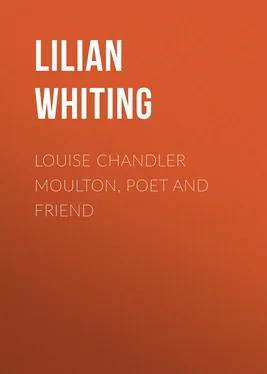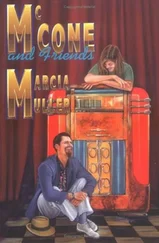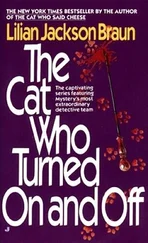Lilian Whiting - Louise Chandler Moulton, Poet and Friend
Здесь есть возможность читать онлайн «Lilian Whiting - Louise Chandler Moulton, Poet and Friend» — ознакомительный отрывок электронной книги совершенно бесплатно, а после прочтения отрывка купить полную версию. В некоторых случаях можно слушать аудио, скачать через торрент в формате fb2 и присутствует краткое содержание. Жанр: Биографии и Мемуары, foreign_antique, на английском языке. Описание произведения, (предисловие) а так же отзывы посетителей доступны на портале библиотеки ЛибКат.
- Название:Louise Chandler Moulton, Poet and Friend
- Автор:
- Жанр:
- Год:неизвестен
- ISBN:нет данных
- Рейтинг книги:4 / 5. Голосов: 1
-
Избранное:Добавить в избранное
- Отзывы:
-
Ваша оценка:
- 80
- 1
- 2
- 3
- 4
- 5
Louise Chandler Moulton, Poet and Friend: краткое содержание, описание и аннотация
Предлагаем к чтению аннотацию, описание, краткое содержание или предисловие (зависит от того, что написал сам автор книги «Louise Chandler Moulton, Poet and Friend»). Если вы не нашли необходимую информацию о книге — напишите в комментариях, мы постараемся отыскать её.
Louise Chandler Moulton, Poet and Friend — читать онлайн ознакомительный отрывок
Ниже представлен текст книги, разбитый по страницам. Система сохранения места последней прочитанной страницы, позволяет с удобством читать онлайн бесплатно книгу «Louise Chandler Moulton, Poet and Friend», без необходимости каждый раз заново искать на чём Вы остановились. Поставьте закладку, и сможете в любой момент перейти на страницу, на которой закончили чтение.
Интервал:
Закладка:
"Mrs. Davis read me Mrs. [R.H.] Stoddard's book ['Two Men'], because you spoke of it so highly. It has, indeed, a strange power,—not one that fascinates me, but which impresses me profoundly and piques my curiosity to know more of the author. I marked some paragraphs which indicated a half-conscious power of imaginative description, which I wish she would exercise more freely. Tell me about her in her personal traits of character.... I hope you will not impugn my taste, dear Louise, when I tell you I like your 'two men' better than Mrs. Stoddard's. 'Margaret Holt' is a charming story. Why is it that Mrs. Stoddard so entirely ignores all sweet and noble emotions?"
Mrs. Moulton's next volume was a collection of the stories which she had contributed to various magazines. It was entitled "My Third Book," and was brought out by the Harpers in 1859. It was greeted as a work which "bears the seal of feminine grace," and which "reveals the beauty of Mrs. Moulton's genius." Of two of the tales a reviewer said, in terms which give with amusing fidelity the tone of the favorable book-notice of the mid-century:
"'No. 101' reminds us of some wondrous statue, her pen has so sculptured the whole story. 'Four Letters from Helen Hamilton' are enough to stir all hearts with their [ sic ] high purpose and the beautiful ideal of womanhood which consecrate [ sic ] them."
Continuing her old habit at school, Mrs. Moulton for many years kept notes of her abundant reading, and the comments and extracts set down in her exquisite handwriting throw a most interesting light on the growth of her thought. She mentions Miss Austen's "Sense and Sensibility" as "interesting, but deficient in earnestness." "Guy Livingston," that old-fashioned apotheosis of brute force, she, like most of the novel-readers of the time, found "fascinating." "The Scarlet Letter" impresses her profoundly, and she copies many passages; the first volume of "Modern Painters" she reads with the most serious earnestness, and comments at length upon Ruskin's view that public opinion has no claim to be taken as a standard in the judgment of works of art. Although the bride of a few months, and not yet twenty-one, she enters with the enthusiasm of a schoolgirl into the larger opportunities of life opened to her by her marriage. To English literature she gives herself in serious study. She writes copious analyses of the history of different periods, and critical studies of various writers. It was perhaps at this period that she began to respond to the work of the Elizabethan lyricists with a sympathy which marked the kinship which English critics found so evident in her poetic maturity.
The list of books noted in these records during the next ten years is large and varied. Mrs. Gaskell, Bishop Butler, Dr. Martineau, Miss Mulock (Mrs. Craik), Anthony Trollope, and later George Eliot and George Meredith, are among the writers whom she mentions; and from the "Self-Help" of Samuel Smiles in 1860 she makes copious extracts. Her taste was catholic, and her attitude toward literature always one of genuine seriousness.
Mrs. Moulton's memoranda for her own stories are both interesting and suggestive. To see as it were the mind of the creative writer at work is always fascinating, and here, as in the "American Notebooks" of Hawthorne, the reader seems to be assisting in the very laboratory of the imagination. Some of these notes are as follows:
"Have the story written by a man. Have him go all his life worshipping one woman, even from boyhood. He wins her,—she is cold but he is satisfied and believes she will grow to love him. After three years she leaves him. He gives his life to seeking her. At last finds her just as she is attempting to drown herself, and takes her home."
And again:
"Have a wealthy family travelling in Egypt, and a child born to them there who shall bear the name of the country. This child, Egypt Sunderland, seems to be strangely influenced by her name, and develops all the peculiar characteristics of the Egyptian women."
She conceives the outline plots for numerous stories,—among the titles for which are "The Sculptor's Model," "The Unforgiven Sin," "The River Running Fast," "The Embroidered Handkerchief," "A Wife's Confession," "The Widow's Candle and How It Went Out." For one projected story her outline runs:
"Show that there is punishment for our sins lying in the consequence of them, which no repentance can avert, or forgiveness condone,—which must be suffered to the uttermost. Make it clear that passive goodness is not enough. We must do something for humanity. That a man who has no moral fibre or practical wisdom has a claim on us for help. For energy and good judgment are as much a gift as are eyes to see and ears to hear. The very lack of practical wisdom gives the one so lacking a special claim on our sympathies."
Perhaps no one ever lived more in accord with this little gospel of human duty than did Mrs. Moulton, and this fact invests the note with a peculiar interest.
The fiction of the day was little concerned with character-drawing or mental analysis, but was largely occupied with a certain didactic embodiment of ideals of conduct. In such fiction a writer of Mrs. Moulton's genuine sincerity of temperament could not but show clearly her true attitude toward the deeper problems of life. The opening of one of her stories, "Margaret Grant," will illustrate this fact.
"The love of life, the love of children, the love of kin—these constrain all of us; but it was another kind of love that constrained Margaret Grant. Curiously enough the first awakening came to her soul from a book written by an unbeliever, a book meant to bring Christianity to the final test of final obedience, and to prove its absurdity, thereby prove that to be a Christian as Christ taught, would overthrow the uses of the world, and uproot the whole system of things. 'Let the uses of the world go, and the system of things take care of itself,' Margaret Grant said when she laid the book down. 'This same religion of Christ is the best thing I know, and I will go where it leads me.' And then she waited for the true Guide, that Holy Spirit which shall be given to every honest soul that seeks—waited for her special work, but not idly, since every day and all the days were the little offices of love that make life sweeter for whatever fellow-pilgrim comes in our way.
"Margaret read to her half-blind grandmother—taught the small boy that ran the family errands to read—helped her mother with the housekeeping, all on the lines of 'godly George Herbert,' who wrote:
Who sweeps a room as for God's laws,
Makes that and the action fine.
But all the time she felt that these were not the real work of her life, that work which was on its way."
With the earnestness of spirit which is shown in this and which so continually sounded in her poems, Mrs. Moulton lived her rich life in the congenial atmosphere which surrounded her. Mrs. Spofford, writing of Mrs. Moulton from personal memory, says of her in 1860:
"She was now in her twenty-fifth year, fully launched upon the literary high-seas, contributing to Harper's , the Galaxy , and Scribner's as they came into existence, and to the Young Folks , the Youth's Companion , and other periodicals for children. Her life seemed a fortunate one. She had a charming home in Boston where she met and entertained the most pleasant people; her housekeeping duties were fulfilled to a nicety, and no domestic detail neglected for all her industrious literary undertakings. A daughter had been born to her, Florence, to whom 'Bed-time Stories' were dedicated in some most tender and touching verses, and, somewhat later, a son whose little life was only numbered by days."
Life was deepening and offering ever wider horizons. With Emily Dickinson she might have said of the complex interweaving of event, influence, and inspiration:
Читать дальшеИнтервал:
Закладка:
Похожие книги на «Louise Chandler Moulton, Poet and Friend»
Представляем Вашему вниманию похожие книги на «Louise Chandler Moulton, Poet and Friend» списком для выбора. Мы отобрали схожую по названию и смыслу литературу в надежде предоставить читателям больше вариантов отыскать новые, интересные, ещё непрочитанные произведения.
Обсуждение, отзывы о книге «Louise Chandler Moulton, Poet and Friend» и просто собственные мнения читателей. Оставьте ваши комментарии, напишите, что Вы думаете о произведении, его смысле или главных героях. Укажите что конкретно понравилось, а что нет, и почему Вы так считаете.












